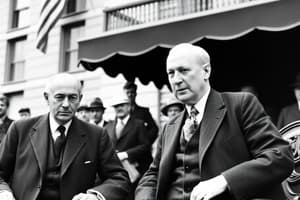Podcast
Questions and Answers
What is a significant issue raised by Seymour regarding the keyword search warrant?
What is a significant issue raised by Seymour regarding the keyword search warrant?
- It constitutes an illegal search and violates privacy rights. (correct)
- It supports the effectiveness of police investigations.
- It has no impact on existing privacy laws.
- It simplifies the process of identifying suspects.
How does the keyword search warrant process differ from traditional search warrants?
How does the keyword search warrant process differ from traditional search warrants?
- It is intended for local investigations only.
- It focuses on a specific suspect's data first.
- It searches multiple individuals to identify suspects afterward. (correct)
- It requires less evidence to issue.
What is a potential consequence of law enforcement's increasing access to digital data?
What is a potential consequence of law enforcement's increasing access to digital data?
- Challenges to existing privacy expectations and laws. (correct)
- Enhanced privacy protections for citizens.
- Greater transparency in police investigations.
- Easier compliance with legal standards.
What legal principle may be tested by the Colorado Supreme Court regarding keyword warrants?
What legal principle may be tested by the Colorado Supreme Court regarding keyword warrants?
What is one of the concerns related to police access to cell phone tracking data?
What is one of the concerns related to police access to cell phone tracking data?
What should be reconsidered by courts in relation to law enforcement's use of technology?
What should be reconsidered by courts in relation to law enforcement's use of technology?
What role do technology companies play in relation to law enforcement's data requests?
What role do technology companies play in relation to law enforcement's data requests?
What may be a risk to society if law enforcement faces limitations on accessing digital data?
What may be a risk to society if law enforcement faces limitations on accessing digital data?
What does the Fourth Amendment primarily protect against?
What does the Fourth Amendment primarily protect against?
Under what condition can police seize evidence in plain view without a warrant?
Under what condition can police seize evidence in plain view without a warrant?
In the discussed case, what was the court's stance on the wife's cooperation with the police?
In the discussed case, what was the court's stance on the wife's cooperation with the police?
What was a key factor in the decision of Horton v California?
What was a key factor in the decision of Horton v California?
What is the significance of the Plainview doctrine in relation to the Fourth Amendment?
What is the significance of the Plainview doctrine in relation to the Fourth Amendment?
What must officers ensure during a search to comply with the Fourth Amendment?
What must officers ensure during a search to comply with the Fourth Amendment?
What does the court's ruling in Hollis v California indicate about warrants?
What does the court's ruling in Hollis v California indicate about warrants?
What aspect of police behavior is critiqued concerning the Plainview doctrine?
What aspect of police behavior is critiqued concerning the Plainview doctrine?
What fundamental principle limits searches conducted by law enforcement without prior judicial approval?
What fundamental principle limits searches conducted by law enforcement without prior judicial approval?
Why was the warrant for searching Coolidge's automobile deemed unconstitutional?
Why was the warrant for searching Coolidge's automobile deemed unconstitutional?
What was one of the outcomes of the police's initial inquiry and lie detector test regarding Coolidge?
What was one of the outcomes of the police's initial inquiry and lie detector test regarding Coolidge?
Which legal standard requires a search warrant to be signed by a neutral and detached magistrate?
Which legal standard requires a search warrant to be signed by a neutral and detached magistrate?
What item did Coolidge's wife provide to the police that was significant in the investigation?
What item did Coolidge's wife provide to the police that was significant in the investigation?
How did the police's actions on January 28th, 1964, impact the investigation into the murder?
How did the police's actions on January 28th, 1964, impact the investigation into the murder?
What was the result of the Supreme Court's ruling regarding the searches conducted in this case?
What was the result of the Supreme Court's ruling regarding the searches conducted in this case?
What does the term 'Plain View Doctrine' refer to in the context of law enforcement?
What does the term 'Plain View Doctrine' refer to in the context of law enforcement?
Flashcards are hidden until you start studying
Study Notes
Coolidge v. New Hampshire
- In Coolidge v. New Hampshire (1971), the Supreme Court ruled that a warrantless search and seizure of the defendant's automobile violated the Fourth Amendment
- The warrant was issued by the Attorney General, who also was in charge of the investigation, creating a conflict of interest
- The Court determined that the warrant was not issued by a neutral and detached magistrate, as required by the Fourth Amendment
- The Court cited the basic constitutional rule that searches conducted outside the judicial process, without prior approval by a judge or magistrate, are per se unreasonable under the Fourth Amendment
- The Court also discussed the "Plainview Doctrine," which allows police to seize evidence in plain view without a warrant, but only when the discovery of the evidence is inadvertent
- In this case, the discovery of the guns in Coolidge's car was not inadvertent because the police had ample opportunity to obtain a valid warrant beforehand
Keyword Search Warrants
- The text mentions a case currently pending before the Colorado Supreme Court, challenging the constitutionality of "keyword search warrants"
- Keyword warrants are different from traditional warrants because they seek data belonging to a suspect, instead searching everyone first and identifying suspects later
- The defense argues that Google must search billions of users to respond to these warrants, raising privacy implications
Fourth Amendment Implications of Technology
- The text discusses the implications of new technologies, such as self-driving cars equipped with cameras, for law enforcement and privacy
- The author raises questions about whether law enforcement should have access to cell phone tracking data and how technology companies should cooperate with law enforcement requests
- The text highlights the need for ongoing legal discussions about the balance between law enforcement needs and privacy concerns in the digital age
- The author emphasizes that existing legal frameworks may need to be reconsidered to address these issues
- The text mentions examples of law enforcement utilizing video footage from self-driving cars in San Francisco and Phoenix
Horton v. California
- In Horton v. California (1990), the Supreme Court refined the Plainview Doctrine, ruling that the warrantless seizure of evidence in plain view does not violate the Fourth Amendment even if the discovery of such evidence was not inadvertent
- This decision broadened the scope of the Plainview Doctrine, allowing police to seize evidence in plain view without a warrant in a wider range of circumstances.
Studying That Suits You
Use AI to generate personalized quizzes and flashcards to suit your learning preferences.




